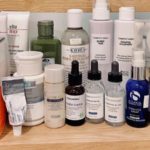Sunscreen can be considered an essential step in skincare as our skin is constantly exposed to sunlight, which can lead to darkening, peeling, and premature aging. Not using sunscreen is also one of the leading causes of skin cancer and skin damage. However, many women still lack a proper understanding of how to use sunscreen correctly and intelligently. There are at least 4 harmful ways of using sunscreen that can decrease its protective effects, and it’s best to stop them as soon as possible.
Sun protection without moisturizing
Protecting your skin from the sun is necessary, but you should not skip the step of moisturizing before applying sunscreen. Nowadays, sunscreens are often designed to be water and sweat-resistant, which can make your skin drier than usual. In addition, combining sunscreen with certain serums can enhance its protective properties, such as serums containing vitamin C.

Not cleansing the face when reapplying sunscreen
When reapplying sunscreen, it’s important to cleanse your face to remove dirt, oil, and sweat. Applying sunscreen directly on this layer of dirt can clog your pores and reduce the absorption capabilities of the sunscreen.
If you can’t use makeup remover or facial cleanser, you can wipe your face with a wet towel before reapplying the sunscreen you used before.
Only applying sunscreen to the face
While the face is often the most cared-for area, other parts of the body can also be seriously damaged by UV rays. The neck, ears, arms, and legs are often neglected and forgotten.
You should protect these areas as well. Once they are sunburned or develop dark spots, it can be difficult to restore them because there are usually not many specialized products available for them like there are for the face.

Using sunscreen with an open lid for too long
Even if the expiration date on the packaging has not passed, sunscreen should not be used for more than 6-8 months from the time the lid is opened. This is the recommended timeframe by experts to ensure the quality of the sunscreen remains intact and does not deteriorate.
If you notice any unusual signs, you should stop using it immediately or be cautious by testing a small amount on your hand and waiting a few minutes to observe any reactions. According to experts, you should not use sunscreen from one season to another, even if it has not expired.
How to Choose and Use the Right Toner for Your Skin Type This Summer
Dien May XANH brings you all the information you need to know about toner and how to use it to care for your skin according to your skin type during the summer months. Learn about the benefits of toner and how to properly use it to clean sebum, remove dead cells, balance the skin, and limit the appearance of acne. Read on for more!


































